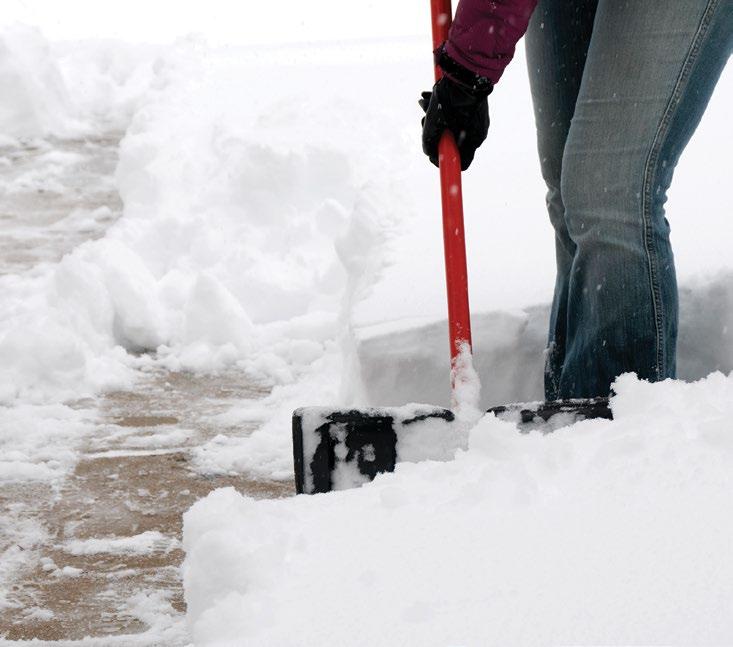
4 minute read
Preparing Restaurants for Winter Prevents Problems Later
With colder temperatures on the way, it’s important to make sure your restaurant is prepared for wintery weather. Regular seasonal maintenance helps keep your store warm and welcoming and your food-service equipment ready for business all season long. With the right preparation, you can reduce your risk of accidents and claims.
Make an Emergency Plan
Help your team take the right steps in case of a severe weather event by putting a plan in place now before the weather gets bad. When a snowstorm hits or the power goes out, everyone should know what to do. Have the plan handy for quick reference and include a list of emergency contact numbers and safety instructions for backup generators, shut-off valves and emergency procedures. Effective emergency planning with your team can help minimize the risks of weather incidents, equipment damage, personal injuries and business disruption.
Stock up on Winter Supplies
Winter storms can come on suddenly, making it tough to stock up on short notice. Order the supplies to manage snow and ice hazards, including ice melt, snow shovels, winter floor mats and wet floor signage. Check outdoor lighting and replace dim or burnt-out bulbs. Now is also a good time to check your emergency supplies, including first aid kits, weather radios, flashlights, batteries and tool kits. Having the necessary supplies on hand can help protect your customers from slip-and-fall accidents, keep your team safe during inclement weather, and protect your franchise and its contents from weather damage.
Service Your HVAC System
Before colder weather arrives, service your furnace and heating system. Schedule a service call to take care of routine maintenance for the whole system and address any problems. Remember to replace air filters, clean ducts and vents, and ensure air is blowing at optimal capacity. A well-maintained HVAC system is important not only for the comfort of customers in the front of the house, but also to ensure equipment in the back of the house is kept at a safe operating temperature. Equipment operated at the proper temperature will last longer and lead to fewer problems.
Consider Cooling the Kitchen
Heating the kitchen is crucial for protecting your equipment but running the heat in a space where ovens, fryers and stoves are always on can cause other problems. An uncomfortably hot workplace could impact the safety of your team members, and many restaurants now cool kitchens in winter. Zoned heating
systems are one solution but retrofitting your existing system can be difficult. Another solution is to invest in portable air conditioning units in areas where heat is likely to be uncomfortable. Take the comfort of your back-of-house workers into account when considering the question of temperature. It can improve efficiency and lessen your risk for accidents and claims.

Prevent Frozen Pipes
Pipes freeze easily in below-zero temperatures, leading to loss of water access and costly repairs from damaged or burst pipes and fixtures. Inside the restaurant, fix leaks and insulate water line pipes. In an extreme cold, let faucets drip Ensure your slightly to minimize the restaurant is risk of damage. Ensure cooler and freezer drains ready for the have freeze protection. Outside your restaurant, winter before shut off the irrigation system and remove hoses winter weather from outdoor spigots in arrives. anticipation of freezing weather. Water left in the irrigation system can lead to ice in the parking lot, causing a fall hazard. Hoses may trap freezing water and damage the faucet. Addressing these risks proactively can reduce the chance of damage to your building and risk to customers and team members.
Prepare for Power Outages
Power outages can significantly impact your restaurant, leading to lost sales, food spoilage and loss of profits. A backup generator makes a wise investment if you are in an area prone to winter outages. With a backup generator, you can minimize losses by powering your refrigeration units, essential equipment and emergency lighting. Make sure employees know what to do in an outage, including operation of the generator, safe food temperature monitoring and other safety protocols. Perform Roof Maintenance
Leaves and debris can accumulate near roof drains and scuppers in the fall. When snow and ice arrive, the blocked drainage can cause a host of problems for the building and personal safety. Ice dams can form and lead to water pooling on the roof, which can overflow onto sidewalks, causing a slip-and-fall hazard. It could also cause water intrusion into the restaurant. A flat roof can also collapse under the weight of pooled water, causing serious damage and business interruption. Perform the proper maintenance before ice and snow arrive to prevent these problems.
Ensure your restaurant is ready for the winter before winter weather arrives. Taking care of your maintenance and preparation needs now can help minimize the risks of weather-related damage, injuries and business interruptions and protect you from claims.
For more risk management tips and information about available coverage to protect your business, contact Lockton Affinity, the co-broker of the Elevanta Insurance Program. Lockton Affinity offers key coverage designed with your insurance requirements in mind. S
Learn more at Elevanta.LocktonAffinity.com or contact the Lockton Affinity team at Elevanta@LocktonAffinity.com or 844-403-4947.
BREWED FOR THE DAY FOR THE DAY











